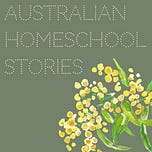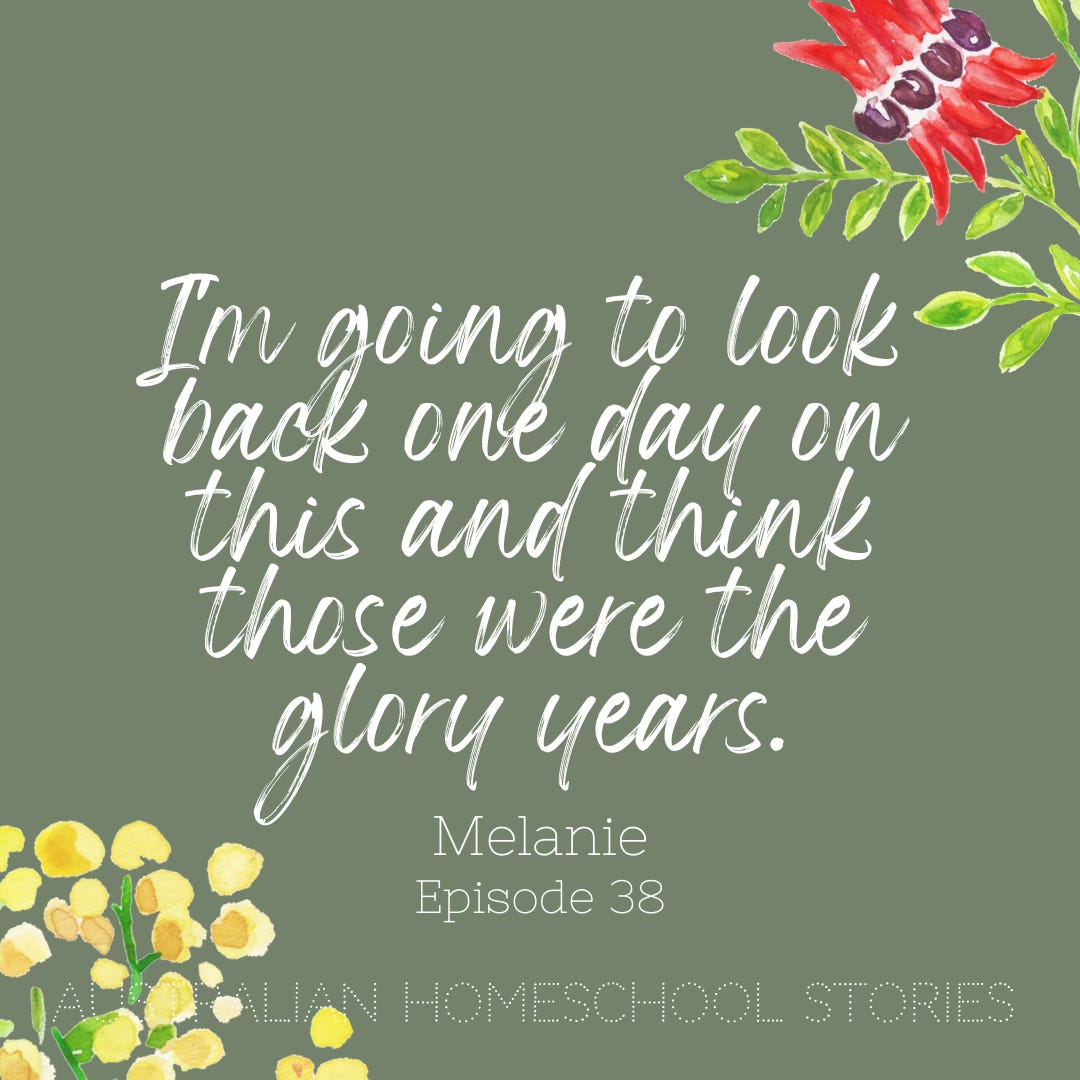Teacher by trade, Canadian by birth, Melanie is here to share how she wound up calling Newcastle home and why she and her partner chose home education for their two boys, aged 7 and 4. In this episode we talk about longing for community in the early years of motherhood, not being ‘ride or die’ homeschoolers, how play evolves as children mature, intentional living, why screens have become the new social playground and the magical power of asking the question ‘What if…?’
This is episode 38 of Australian Homeschool Stories - Melanie’s Story.
Summary:
Melanie was teaching abroad in Qatar when she met her Australian partner, a RAAF (Royal Australian Air Force) pilot. She was told at 25 that she would never have children, yet they fell pregnant and her partner convinced her to move to Australia where they could start their family.
Melanie talks about the differences between schooling in Canada and Australia, namely that the school year in Canada felt like it flowed from one traditional occasion to the next. The whole year was spent preparing for very traditional occasions that Canadians hold dear. The Australian school system is the same all the time. There isn’t this continual switching from celebration to celebration.
She herself went to a Christian primary school which had a shaming culture. But she did have one teacher who inspired her to become a teacher herself. Through music and inter-generational connections she brought a feeling of community into her school experience that she has never forgotten.
As she got older, her parents realised that Melanie was struggling to sit still in the classroom and teachers began recommending she be medicated. Her parents knew that she just had a lot of energy and needed to put that energy somewhere. She found a passion for musical theatre and ending up enrolling in a school for the performing arts. Whilst wonderfully fulfilling educationally, it also meant moving away from her family home and this displacement left her unsure of herself and where she belonged.
Both Melanie and her partner describe themselves as high achievers. Melanie has degrees in anthropology, sociology and teaching and is currently completing her PhD in Digital Wellbeing for Children and Teens. She loved teaching internationally and after the birth of her first son was keen return to work as a way of establishing community in this new country, with no friends or family for support and a partner who was constantly working away.
“If I could go back and change everything, I would. I would change so much of those first years of my first son being born.”
Her eldest son attended daycare so that she could work.
“I really wanted community but what I ended up having was employment.”
Melanie recalls the paradox of being around everyone else’s kids and not fully seeing what she was missing at home.
“Social emotional connection is so much more important than anything else in a child’s day.”
If your child’s teacher is a parent, they probably have your child’s best interests at heart.
As a teacher she witnessed a common difference amongst the genders transitioning into school. Girls came in and thrived whilst boys were falling apart.
Due to this observation and being a parent of boys herself, she ran a kindergarten readiness account to coach parents of boys about how to prepare them for school. In hindsight she was in the mode of ‘fix the child’, only later did she come to see the system as the problem.
Melanie asked for an exemption for her son to defer beginning school. Her son is a child that wants to fit in and she was afraid she would have lost him if she had sent him to school.
During this year, when her son had stopped attending preschool and was yet to attend primary school, his confidence grew. They saw a huge change in their son.
It was her partners confidence in Melanie to homeschool that made her believe this was the right path for their family.
Being an RAAF family, they have no extended family support where they live. They work, study and learn all together at home under the same roof.
She does’t like the ‘ride or die’ mentality of homeschooling and is open to sending her boys to school one day if it is in their best interest.
“Right now homeschooling is working for us, and I’d love to stay a homeschooling family if we can."
Melanie shares her golden nugget - The ‘What If…’ game that helped their family dream up and create the life they live now.
“I’m going to look back one day on this and think those were the glory years.”
When you know better, you do better and her second child has had a charmed life of absolute connection and has fallen naturally into homeschooling. A fish doesn’t know the water it swims in - this is just his reality.
Her boys go to a bush school drop off two days a week. The kids spend the entire day in free flow play outdoors with other homeschoolers. This allows her to work part-time and the kids have some independent time away from the family.
Friday - Monday is just freedom for her boys. They have some busy days Tuesday - Thursday, but still in free flow, play mode.
“Play can mean so many different things. Play looks different for every child. It’s about having the freedom to be curious and having the freedom to step into whatever it is you are curious about.”
When her eldest was in daycare she felt disconnected from him. Now connection and curiosity, drive their homeschooling as well as living intentionally.
As high achievers, homeschooling didn’t come naturally to her and her husband, having to focus on their children’s education and not their own careers.
At the beginning of every term they talk about the last term - what the enjoyed, what they didn’t, what was working, what wasn’t, what do they need more of, etc. They then come up with a word to guide them through the term ahead.
“Having an intention and setting an intention for every term and them seeing how we are going to follow through with it, allows them to bring intention to their day or week.”
Melanie’s vision for the future:
“I want our family to have space - the space to grow food, the space to slow life down to an absolutely crawl and just enjoy these golden years that we have with the kids.”
She also would love for them to become a world schooling family when the kids are older.
Living in a big city, there are so many homeschoolers and so many resources. It is endless what you can do as a homeschooling family.
You don’t have to be an expert at something to do it, you can learn as you go. Her partner is living proof of this and inspires her to keep an open mind.
“He saw a path and he took it. I’m seeing a path, and I’m taking it.”
What we need more of is less here’s how the schools are doing it wrong and more practical application books - here’s how you can do it. We need less criticism of parents and lifestyles. We need more support for parents.
Melanie’s take on screens is that it matters how you use them, the age of the child and the physical environment that they are in. It is worth considering not just the child, but the whole environment, how, when and what type of screen and it’s uses.
“We as adults are doom scrolling our lives away. We are. We know it’s bad for us and we realise that.”
The social landscape for teens and adolescences has shrunk. They’ve been deemed a burden to society and therefore found a new playground on the screen.
Melanie recommends using your own home as the space where your kids and their friends can come together, be silly, make mistakes and eat all the food.
The adolescent years are where we need to allow our children to thrive and be themselves in the real world.
Melanie enjoys sweating out her negative energy, salsa dancing and reading, as well as staying connected to friends and family in Canada.
“Homeschooling looks different to everyone and you don’t have to read a single book to start homeschooling your child. If you see a pathway forward, just go for it.”
The parent knows the child so much more than any teacher.
On the backward nature of parent teacher interviews…
“Suddenly you are disconnected from your child so much so that someone else is spending more waking hours with your child and is therefore able to report back on your child and how they are going… we put parents in a such a precarious position. I’ve never seen parents feel so deflated.”
“What’s holding parents back (from homeschooling) is that they don’t feel empowered, that they know their child enough that they could spend more time with them or give their child what they need. What a flaw in our society.”
Dive Deeper:
Mothering our Boys by Maggie Dent
It’s Complicated by Danah Boyd
Life Without School podcast - Episode 25: Finding Balance with Screens
From What is to What if: Unleashing the Power of Imagination to Create the Future we Want by Rob Hopkins
Do Schools Kill Creativity? TED Talk by Sir Ken Robinson
Connect:
Instagram - @freespirithomeschool
Instagram - @digital_wellbeing_teacher
This podcast is recorded on the lands of the Bunurong people of the Kulin nation. I pay my respects to elders past, present and emerging and acknowledge that sovereignty was never ceded. This always was, always will be aboriginal land.
Original Music by Daniel Garrood @garroodcomposer
Listen on Spotify here
Australian Homeschool Stories the podcast can be heard on all major podcast streaming platforms.













Share this post